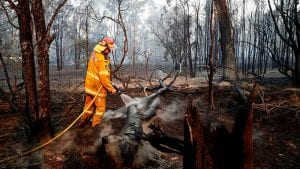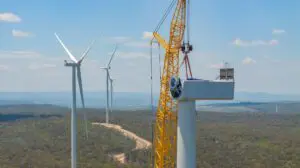The developer of the Moonlight Range wind farm has expressed “extreme disappointment” at the Queensland government’s decision to block the project, and says it “respectfully disagrees” with the state planning minister’s justifications of the shock move.
Others in the industry, however, are not being quite so diplomatic, describing the Liberal National Party’s about-face on the $1 billion project as “highly political,” and the reasons given for making it as “extremely difficult to believe.”
Queensland deputy premier and planning minister Jarrod Bleijie confirmed on Monday that he has refused approval for Moonlight Range, following a “comprehensive reassessment” of the application for the up to 450 megawatt wind farm and battery, which was approved in December.
The minister’s decision, which cannot be appealed, is part of the Liberal National Party’s bid to retrospectively change the rules governing renewable energy project assessments, to ensure they face “the same rigorous approval processes” as other major resource developments.
The LNP has already said it will rip up the state’s renewable energy target – of 50 per cent renewables by 2030 and 80 per cent by 2035 – ensuring that it remains Australia’s most coal dependent state.
It has also made clear its aversion to large scale wind farms, despite the declaration by the state’s biggest energy users – the aluminium smelter and alumina refineries operated by Rio Tinto – that they need to source power from renewables rather than coal by the end of the decade if the assets are to have a future.
The LNP has also been keen to tighten regulations governing how wind and solar developers approach community engagement; at face value, a much needed reform – and not just in Queensland.
But in the context of the Crisafulli government’s actions since its election – backing away from state renewable targets and underwriting ageing coal plants – there is widespread industry concern about policy overreach and collateral damage to the state’s efforts to decarbonise its grid.
In his decision on Moonlight Range – which proposes up to 88 wind turbines, a battery energy storage system and 434 hectares of vegetation to be cleared – Bleijie says community consultation was “minimal and insufficient” and had failed to gain “overriding community acceptance.”
Bleijie says a review of the project application found it did not meet the requirements of a new development code (State Code 23) that came into effect in February of this year, or of new solar and wind farm rules unveiled at the end of April.
“For the reasons above, I consider that the application fails to demonstrate compliance with SDAP State code 23 version 3.2 namely the Purpose, PO17, PO23 and PO26,” the minister said.
He referred to impacts on local community amenities, services, housing and infrastructure and “the impacts of the wind farm on communities and individuals (PO26).”
“I consider that the nature of the matters of non-compliance are not such that conditions may be imposed to remedy the non-compliance.
“Accordingly, the application should be refused to the extent it is for a material change of use for a wind farm.”
Bleijie says the assessment considered “significant feedback” from local residents and stakeholders, as well as the impacts on local infrastructure and the environment, with more than 550 submissions received during the consultation process.
He says the objections raised concerns about community, social and environmental impacts – including contamination impacts, bushfire hazard and “amenity impacts, specifically noise, vibration and shadow flicker impacts.”
Concerns were also also raised about the impact of the workforce for the wind farm, and complaints lodged about “minimal community benefit” of the project and lack of consultation “prior to lodgement” of the planning application.
Bleijie says that while the application notes that community feedback was predominately neutral or negative, there has been “no evidence or information from the applicant to identify concerns raised and how these have been addressed in the proposal.”
“If communities support these projects, they will go ahead,” the deputy premier said in comments on the decision that were widely reported in the mainstream media on Monday. “But 88 per cent of local residents opposed the Moonlight Range Wind Farm proceeding.”
A closer look at the detail of the decision notice, however, reveals that only a small proportion of the “more than 550” submissions were from people deemed local to the proposed project.
“I received 554 representations in response to the proposed call in notice, of which 508 representations were received from individuals (rather than companies or organisations),” the minister’s notice says.
“Of these 508 representations, a total of 142 representations were received from local residents in vicinity to the site the subject of the application. 88 per cent of the local resident representations (i.e. 88% of the 142 received) objected to the proposal and supported the call in.”
In comments emailed to Renew Economy on Monday afternoon, Greenleaf Renewables said the $1 billion wind farm and battery it was developing with global investment giant Brookfield had the support of “many local landholders, regional businesses and community groups.”
“Greenleaf respectfully disagrees with several of the justifications outlined in the decision notice, which are cited as the reasons for decision by the Hon Jarrod Bleijie MP,” the company statement says.
“Since the inception of the project in late 2021, Greenleaf Renewables has conducted thoughtful and transparent community and stakeholder engagement with the local communities and key stakeholders surrounding the project.
“We are extremely disappointed by the outcome, particularly given the project’s potential to contribute significantly to Queensland’s regional economic development and near-term energy needs,” the statement adds.
“We are also disappointed for the many local landholders, regional businesses and community groups that supported our Project, and want to see it progress.
“The project could generate approximately 450 megawatts of clean electricity, enough to power around 260,000 homes and create up to 300 jobs during peak construction, with additional long-term operational roles,” Greenleaf says.
“We are currently reviewing the feedback provided by the Deputy Premier. This information will inform the next steps.”
Ken McAlpine, an industry veteran with roles at Danish wind giant Vestas and on the Clean Energy Council, said on LinkedIn on Tuesday that Bleijie’s decision to kill off Moonlight Range was “highly political and confirms the fears of investors in clean energy projects in the Sunshine State.
“The signals in recent months from the minister (who is also Deputy Premier) have not been good and this latest decision shows who is the real boss inside the Queensland government,” McAlpine writes.
“It’s a bad result for Queensland but happily for investors there are plenty of other states in Australia who welcome clean energy investment and would never pull a stunt like this.”
AltEnergy, also on LinkedIn, said on Monday that it was “extremely difficult to believe” that Greenleaf “didn’t consult extensively or widely enough in the community.”
“Look at the hoops Greenleaf Renewables had to jump through to initially gain development approvals last year,” a post published on Monday says. “Not all of it to do with community directly, but with this level of consultation it’s difficult to believe the community was ‘shut out’”‘.
“Not a great outcome for investor confidence,” another observer writes. “If [Moonlight Range] has been overturned on sound environmental grounds – fair enough and it’s the correct decision. Then it should not have been approved in the first place. The uncertainty is the problem.”
Paul Sullivan, the general manager of AltEnergy, says the decision notice “sets the bar very high for developers of (presumably) all impact assessable projects in the state” to include provisions for broad social issues ranging from impact on local services “including clinics, hospitals, police and emergency service.”
Sophie Nicholls, from renewables recruitment outfit, Talesca, says the decision raises important questions about the balance between community engagement and the urgent need for sustainable energy solutions.
Shane Quinnell, head of development in New South Wales and Queensland at Westwind Energy, says the decision adds to what has been a “turbulent year” for the renewables industry.
“Policy uncertainty, paused (and unpaused) wind farm approvals, and now, a fully approved project scrapped. For investors and developers, the signals are unstable,” Quinnell says on LinkedIn.
“The Queensland government says it’s simply aligning renewables with other sectors like gas and mining. But many of the new requirements don’t apply to other sectors – that inconsistency raises questions.
“I don’t know the Moonlight project in detail, but the headline claim that ‘88% of locals’ opposed it during the call in period deserves scrutiny,” Quinnell adds.
“Only 27% of submissions during the call-in were from locals, and organised, politically motivated, anti-renewable lobbying is active in the area. Also, supporters and neutral stakeholders rarely make submissions – a fact often overlooked.
“Yes, industry must engage communities and design better, more responsible projects. But cancelling approvals and dropping major policy changes with no notice isn’t the way forward.
“The renewable energy industry is ready and keen to work with the Queensland government and engage on any reforms required to align community, Government and industry and benefit the state of Queensland.”








